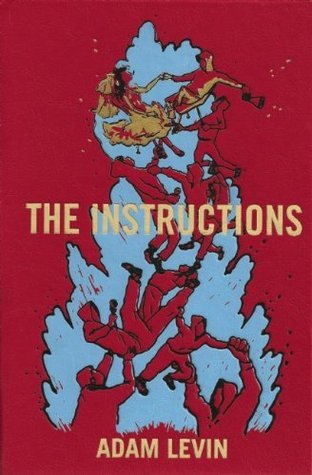What do you think?
Rate this book


1030 pages, Hardcover
First published November 1, 2010

 come to my blog!
come to my blog!
Maybe take away the Shovers’ semi-private-club status? But then they’d meet at recess, wholly private, with impunity. Ban scarves in the classroom? What about cold kids? - p241The book is as much about these little things as the big themes that will get over-focused on. The character’s, too, were so real, though they all spoke Gurion-speak: even the ones not like him at all have a particular him-ness (maybe because he’s narrating). At the same time, the characters are easily distinguishable, and have very strong distinct personalities of their own. Interesting paradox.
I liked eggs soft-boiled, but in the morning couldn’t prep them, not if I wanted to put them in my stomach. Those insect-like screams emitted by the shell when you pried its fragments from that film they clung to--the mastication of wet chicken sounded musical by comparison. p.773What of the big things? What is the book saying? I have no idea. Something about terrorism? Something about God/belief? Was it about verbosity/iniquity? About verbose boys who are too smart for their own good? About the institutional aspect of education? Modern technology? The modern world’s tolerance for divergent thought, or true uniqueness? I don’t know but I know by the end I knew it was about something but maybe also about multiple things or maybe about something in a way that it wasn’t totally about it, otherwise it would be a shallow one-dimensional work anyway. By the end, I wasn’t even sure what was happening sometimes. The last hundred pages totally devastated me, and I shall put a SPOILER warning here (though if you pay attention to the very beginning, none of this will really be a surprise, but who will remember the beginning after 1000+ pages? The shocking-ness of the ending is that everything was built up so carefully and logically that it doesn’t seem like violence (though talked about and even performed in small doses, but TRUE violence, TRUE irrevocable violence of the death-sort seemed beyond the scope of possible outcomes, however much foreshadowed, until it comes) seemed unimaginable at least to me, as I was able to imagine the rest of the story so fully: not unimaginable as in unbelievable, but believable, totally believable, yet completely shocking and really really fucken sad. The Gurionic War passage, the 100+ pages or so of it near the end anyway, was such a dizzying array of action, and of action that made me want to turn away from it, because I had so invested in these characters and I could see now the inevitable damage and I did not want to see it happen I did not want to know that it was going to happen even though I knew and I knew that I knew. What use was it?
So even though, on reflection, Main Man’s weird utterances seem to have been obliquely prophetic--and maybe they were--there was no good reason to believe they were prophetic at the time.And what to say now? How to end this review? It would be unfair to not mention the book’s flaws. The ‘damage’ at the end, though obligatory, became dull to read after a while. I can only take so much straight action and so much of this book was an alternation between action and thought whereas the last 200 pages or so were almost entirely action in a way that seemed... a bit meaningless. What does it matter what happened, as much as it matters that it happened and that we know something happened, and are able to reflect on the end result of what happened. The specifics seem superfluous = who was standing where, doing what to whom etc. This is a gripe on my part, even though I know it is probably necessary to have that action described in detail, to keep consistency with the character of Gurion feeling overly important about these events. Also, little things with characters, like how Eliyahu seemed to suddenly change personalities, becoming more susceptible to violence, even inviting it, perhaps I missed what brought this on. Also, the ending which affected me deeply, but I’m not sure what to think about it at all, and feel a vague sense of disappointment at the same time. Also, the voice which is captivating in its endless logical digressions became slightly tiresome at around page 635. There are probably more, but really it does not matter. The book has flaws but the book is a triumph also. It is a dizzying experience and I don’t know what to think about it, and that makes me want to think about it all the more.
